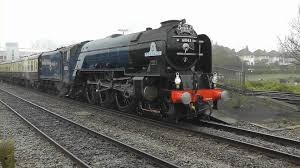The Case Against Re-nationalizing the Railways
It would be an understatement to say that the Labour party has endured a fairly torrid start under the new leadership of Jeremy Corbyn. His handling of the (admittedly hostile) media, previous comments he has made on the IRA and other such groups, his handling of the shadow cabinet appointments, his much debated views on trident, and the fact that at this moment it’s difficult to get a handle on what exactly the Labour party’s position on any given issue is, given the widening chasm between it’s various factions have all contributed to this baptism of fire. And with all this coming in the wake of the electoral battering Labour suffered in May, it wouldn’t be hyperbole to say that 2015 will surely go down as one of the most harrowing years in their history. However, one issue that not only are the party united on, but that in fact enjoys the majority of public support, is Corbyn’s pledge to re-nationalize the railways, should he defy the odds and become prime minister in 2020.
 Corbyn has capitalized on an increasing public frustration with rail travel in the UK. Public investment in the railways has trebled over the past two decades, yet rail fares have risen faster than inflation, and for some journeys of comparable distance and time, the UK has the highest rail fares in Europe. So it’s not difficult to understand why the public are increasingly sympathetic to the idea of giving British Rail another crack at the job. Sadly however, on this one beacon of light in a constant downpour, I must drop some more rain on Mr Corbyn’s parade: re-nationalizing the railways is a bad idea. Or, at the very least, it isn’t a good one.
Corbyn has capitalized on an increasing public frustration with rail travel in the UK. Public investment in the railways has trebled over the past two decades, yet rail fares have risen faster than inflation, and for some journeys of comparable distance and time, the UK has the highest rail fares in Europe. So it’s not difficult to understand why the public are increasingly sympathetic to the idea of giving British Rail another crack at the job. Sadly however, on this one beacon of light in a constant downpour, I must drop some more rain on Mr Corbyn’s parade: re-nationalizing the railways is a bad idea. Or, at the very least, it isn’t a good one.
That’s not to say privatization has been wholly successful, it most certainly hasn’t been, but it’s failures have largely been due to the way in which British Rail was sold off in the 90’s under the John Major-led Conservative government. The tracks are operated by the state-owned company Network Rail, while the trains themselves were separated, allowing different train operators to have use of the same track in a bid to create competition. Network Rail however is now £34 billion in debt and is currently in the early stages of what is likely to be the eventual breaking up of the company.
This may ultimately lead to improvements, it may not, but ultimately privatization has been more of a success than a failure. British Rail was one of the most reviled institutions in the country before it was sold, and privatization has seen the creation of better trains and timetables, and in spite of the popularity of re-nationalization, the number of train journeys per year has doubled since British Rail was sold off, following a long period of decline before 1994. The argument that it would reduce fares is torpedoed by the fact that the transport office already has the power to cap rail fares, with some fares already rising more slowly on non-competitive routes than they do on competitive ones. Fares might be simplified if state-owned, but there’s no evidence that they would be any cheaper, and indeed any decrease in fares would probably be overridden by the increased burden to the taxpayer that would come with a publicly owned railway system.
In addition, Corbyn’s pledge that re-nationalization will only occur when current contracts expire will mean that the process will be painfully slow. Indeed, only one-third would be state-owned by 2025, and with no prospect of retaining their contracts, private investment would plummet between now and then. And of course nationalization would lead to even greater inefficiencies given that the strike-happy railway unions aren’t likely to be treated strictly under a Corbyn-led Labour party.
It is a common right-wing myth that the private sector is always more efficient than the public sector, there are some things that the state can and will always be able to do better than the private sector, healthcare being the most obvious but by no means the only example. However there is no evidence that operation of the railways is one of those industries. The frustrations of British commuters is understandable, given the overcrowding and very high fares that many of them face, and more must be done to improve the current status-quo. But the harsh truth of the matter is that there is no evidence to support the idea that re-nationalizing the railways would do anything to improve things, and indeed if history is any indication, it would only be a step backwards.
